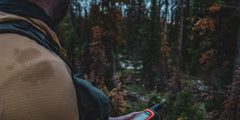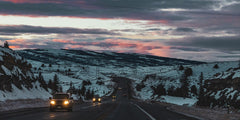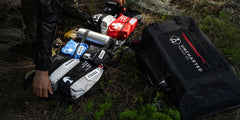Adventure Mishaps 101: Getting Lost
March 30, 2023 | Christian Schauf

For most people, getting lost is a genuine fear. And many, including myself, have experienced this situation more than once.
I was on a guided elk hunt with my dad a few years back. The first morning we left our camp around 3 am, in complete darkness, and hiked for hours to get to a zone we wanted to hunt. After hunting for most of the morning, we decided to split up and meet at a rallying point in the evening before returning to camp. I'd go one way, and my dad and the guide would stay together and go another way.
As you can probably guess, we could not locate each other at the end of the day, and as the sun went down, I found myself alone in a grizzly-full area of Montana. After spending an hour making sure I wasn't just over the hill from my guide and dad, I decided I needed to find my way back to our main camp.
Luckily, I had dropped a GPS pin at base camp on my Garmin Fenix 2 Watch the day before. I scrolled through the menu, loaded my pin, and my watch gave me an arrow and a distance; I'd find camp 6.7 miles to my west.
When I finally arrived at camp in the dark, our guide and his team were putting together a search party, including helicopter support, to find me. They were certain something terrible had happened and were shocked that I could find my way back! And, if I remember correctly, everyone on the trip got the name and model of my watch.
I hate to say it, but given all the tools available today, getting lost should be almost impossible. Here are some of the best tips and tools to make sure it never happens to you.
-
Use your phone - This is #1 because everyone has their phone on them. No matter if you're in or out of service, GPS still works. Drop a pin at camp, your car, or the trailhead, and even without the ability to download a map, you'll still have a North Star to head toward if you get turned around. As a bonus, download OnX Maps - which allows offline downloads of high-resolution maps and has all the info you'll ever need.
-
GPS Watch - As my story described, get a watch with GPS - my pick is a Garmin - and make sure you've dropped pins or tracked your route from your starting point. Garmin lets you 'tracback' - meaning follow back the same trail you came in on, or return to start, which enables you to go as the crow flies back to your starting point. A tool I'm always amazed at how many times I end up using.
-
When possible, carry a paper map. Technology can fail, run out of batteries, or break during a nasty fall. A redundant map is a great idea to ensure you're always covered.
-
It is critical to notice and make a mental log of landmarks, rivers, and the direction of the sunrise or sunset. If you're on a trail, leave a marker at each fork so you always know the way back. If you're off-trail, do the same but more frequently.
Latest Articles
-
 Essential Driving Tips for Winter and Wet Weather ConditionsResourcefulnessFebruary 12, 2025
Essential Driving Tips for Winter and Wet Weather ConditionsResourcefulnessFebruary 12, 2025 -
 Survival Systems: What They Are, What’s Inside, and Answers to Our Most Common QuestionsResourcesJanuary 16, 2025
Survival Systems: What They Are, What’s Inside, and Answers to Our Most Common QuestionsResourcesJanuary 16, 2025 -
 Surviving the Polar Vortex: Why Cold Weather Wreaks Havoc on Your Car Battery and How to Get Back on the RoadResourcefulnessJanuary 06, 2025
Surviving the Polar Vortex: Why Cold Weather Wreaks Havoc on Your Car Battery and How to Get Back on the RoadResourcefulnessJanuary 06, 2025
-
 Essential Driving Tips for Winter and Wet Weather ConditionsResourcefulnessFebruary 12, 2025
Essential Driving Tips for Winter and Wet Weather ConditionsResourcefulnessFebruary 12, 2025 -
 Surviving the Polar Vortex: Why Cold Weather Wreaks Havoc on Your Car Battery and How to Get Back on the RoadResourcefulnessJanuary 06, 2025
Surviving the Polar Vortex: Why Cold Weather Wreaks Havoc on Your Car Battery and How to Get Back on the RoadResourcefulnessJanuary 06, 2025 -
 Essential Items for Comfort and Safety in Your Carry-On Luggage During High-Risk TravelResourcefulnessAugust 08, 2024
Essential Items for Comfort and Safety in Your Carry-On Luggage During High-Risk TravelResourcefulnessAugust 08, 2024



